“The reason we’ve had any kind of success on either side of the pond is that we work our asses off.”
Daniel Graves hasn’t been resting on his laurels. After achieving breakthrough success with Aesthetic Perfection’s sophomore disc, A Violent Emotion and an insanely busy touring schedule, he set about stymieing expectations with last year’s excellent All Beauty Destroyed. After dropping a second remix EP, he’s now touring for All Beuty, and already at work on AP’s fourth record. We caught up with Daniel before Aesthetic Perfection’s show in Vancouver with [X]-Rx and BlakOpz.
ID:UD: Your project is called Aesthetic Perfection, and you named your last album All Beauty Destroyed. Was that a reference to deconstructing yourself a bit on that album?
Daniel Graves: I don’t really want to go too much into the meaning behind that. I think it’s really important for the listeners to interpret it and put their own meaning into it. Obviously it’s meant to be slightly ironic, Aesthetic Perfection and All Beauty Destroyed, they’re connected, just in opposite ways. About deconstructing myself, this really was the most introspective work I did. That’s kind of all there is to that one. *laughter*
ID:UD: When the album first came it got some good reviews, but we also saw you share a lot of negative opinions it received. Were you surprised at all by those reactions to it?
DG: No, not really. I kind of expected to get a lot of harsh reviews. Back when the Fight Club DVD came out the artwork on the inside had only the negative reviews of the movie, and I loved that. Ever since that I thought it was an awesome idea to publicize your negative reviews, I kind of enjoy that more than the positive ones. Obviously I like the positive ones, but really, really spiteful, hateful reviews are also kind of more entertaining because it means you got to somebody in some way. If people love the album, amazing, I love that. If somebody else hates the album, I’m equally pleased because it’s so much better than just someone saying “meh”.
ID:UD: There’s a big range of songs on All Beauty Destroyed, like the title track is just you and piano, it’s very different from A Violent Emotion. How much of that was an organic change?
DG: It was extremely organic. It wasn’t consciously saying “The record is going to be like this”, I just sat down and started writing songs and this is what came out of it. While I was writing I was like “Man, this is a real departure.” *laughter* I couldn’t really do it any other way, if I had tried to make A Violent Emotion part 2 that would have been dishonest. A lot of people got into Aesthetic Perfection through A Violent Emotion, but they never realized I had a record before that that was vastly different from it. If you follow the band from the very beginning, Close to Human, A Violent Emotion, All Beauty Destroyed, they’re three totally different albums with three totally different sounds. With the new record I’m working on now that’s almost done…
ID:UD: Really?
DG: Yeah. I actually had six months off before this tour, so I just sat at home and I wrote and wrote and wrote. I’ve got like maybe 7-8 songs that are done and 7 more that are in various stages of completion. If I don’t spend the next 2 years on tour I think I can have the next record done in a couple of months.
ID:UD: Is it going to be as much of a departure as All Beauty Destroyed?
DG: Oh yes. *laughter* It is completely different, so if you got into Aesthetic Perfection through All Beauty Destroyed, I’m sure the reviews are gonna be “Fuck that guy, he totally changed. I’m so disappointed!” *laughter*
ID:UD: How important is it to you to do something completely different with every album?
DG: It’s important for me to be artistically honest. If you’re content and happy and want to keep making the same record over and over again, that’s cool. I’ve always been interested in pushing my own limits and exploring new ideas because I’m very ADD. I can’t stay on one thing for too long, I have to move on and try to improve and do something else. I’m bored otherwise.
“The internet is a great way to find new music, but it’s a wall of noise…”
ID:UD: When we first saw you in Vancouver we hadn’t heard the project before. You were opening up on the :SITD:/Imperative Reaction tour, but we were very impressed with your stage presence. Your profile has grown since then, this is your tour with two opening acts. How much of that do you attribute to being on the road so much?
DG: I would attribute any success we’ve had to touring. The internet is a great way to find new music, but it’s a wall of noise, and it’s hard to pick something new out of that. Our opening slot with Imperative gave us a launching pad and our future tours with Combichrist really put us out in front of people. I don’t want to say our live show is good, but you said it was good so, if we do indeed have a good live show – I hope we do – then that’s something people in the audience who don’t know the band have a reason to check us out.
ID:UD: On that topic then it was you and a keyboard player, right now it’s you and a drumkit, is it just you guys playing this time out?
DG: Yeah, we’re back down to a two piece on this run. It’s out of necessity. We planned a tour where it was gonna be a three-piece like we have been for the last few years. This tour was kind of, I wouldn’t say fraught with problems, but the crew changed constantly. At the very last minute we lost a keyboardist, we found another one who also dropped off. We started thinking about other options and none of those seemed to pan out and we were like you know what, we would much rather do this as ourselves, as a two piece then forcing it to be something it can’t be. I’m essentially DJing the songs and Tim is drumming along with them. We feel like it’s a lot better to do it this way then find someone at the last minute who might not even be playing. It just feels more honest.
ID:UD: We’ve talked to people a lot about the challenge of playing sequenced music live, how much you can realistically do on stage and avoid having someone standing behind a keyboard playing with one finger or pretending to play period. How did you develop your show, did you consciously say “It’s time to add drums”?
DG: It’s a lot more organic than that. Tim came to us through a band he was playing in called genCAB. I saw him drum with them when they opened for us on that Imperative tour in LA. I was like “Wow, he’s a really good drummer, I should talk to him about the possibility of joining us”. In the chaos you meet people you think could bring something to the table, and that’s just how it happens.
“There’s a remix culture, but I also feel like a lot of people get too into the idea of remixes, and the market gets flooded with too many of them.”
ID:UD: We read an interview with you a few years ago as a means of working when you’re creatively blocked. We’ve noted how distinct your work is in that regard, you can tell an AP remix when your hear it. How does your workflow differ from remixing from working on your own stuff?
DG: When I do remixes for other scene related bands I’m usually approached by the label or the bands themselves. I usually do a few of those a month, and I enjoy that. But when I do the stuff like the Lady Gaga remixes, it’s when I’m plowing away on a record and I’m feeling overwhelmed and creatively dry I try to break out of that, and find an outlet to do something different. I really love pop music, and I got the idea to do a Katy Perry remix, just to see where that goes when I can’t work on my own songs anymore. I enjoy that, and it helps you remember that you’re making music because you enjoy it, without it having to be about finishing a record.
ID:UD: In all electronic music, but especially in industrial it seems like there’s a real remix culture that goes on between acts trading mixes. It seems like a lot of connections get made that way. Has that been your experience?
DG: It’s usually a connection that’s already there. It’s like, I’m friends with Combichrist so I can call Andy and be like “I need a remix, can you help me out?” There’s a remix culture, but I also feel like a lot of people get too into the idea of remixes, and the market gets flooded with too many of them. Like, “I’ve got ten songs on my album, I need to put four remixes on it to extend the playtime.” I think that’s kind of shitty. When a remix is done well, a really really good one, it’s because you hear the song and you say “Okay, I can do something great for that!”. I think people forget that when they’re just trying to extend playtime or make an EP.
ID:UD: In that case, was it you who shopped out the mixes for the two EPs from the album?
DG: Almost all of them were people I sought out. I know these bands, and I knew they could do something really good. I was excited to talk to Réal from Comaduster, I never had any contact with him before, I have his EP and think it’s awesome. I Facebooked him blindly and asked him to do a mix. I got to work with Daniel Myer who I’ve known for years, I finally pinned him down and forcing him to do a remix for me. And of course the remix contest is fun, you get to hear a lot of new ideas and some kids who have a lot of talent who could maybe use a push.
ID:UD: You’ve switched a lot between various styles of vocals, clean, harsh and vocoded. How does that relate to the character of the band?
DG: I don’t know. I get bored so easily, I’ve always like music that’s really dynamic and has a lot of different vocal ideas. I’m constantly trying to become a better singer and vocalist and it’s something I’ve been working hard at for the last year, and I’m not even close to the point that I’d like to be at. It’s something I’ll be working at and developing ’til the day I die. I like interesting and unique vocalists so it’s that pot at the end of the rainbow, it’s what I want to be. That’s the motivation.
“A lot of people don’t want to get out of their comfort zone, don’t want to lose money to tour.”
ID:UD: You’re a band with a profile in Europe. That’s something many North American acts never get the opportunity to do, tour Europe and vice versa, with European acts that never make it over here. It’s a divide some bands never get over. What do you think you guys have done that have enabled you to get over that divide?
DG: I think it’s a cop-out for people to say it’s not possible to do it. The reason we’ve had any kind of success on either side of the pond is that we work our asses off. We get no sleep, we starve, we ride in a van for 12 hours to get to the next show and load-in, go to the hotel and sleep for an hour and then go again. My first European tour was booked by me. I went on the Side-Line forum and asked if any promoters were interested in bringing me out. I got two people, so I started hitting up every single person I ever met who was European and was like “Can I do a show?” I played dives, I played to twenty people. You never give up, you push and push and the more you push the more you can inch your way there. The first European tour I did myself, and it was terrible but I made friends and I made connections and some of those connections are still going strong. There is a divide, but it’s a monetary one and how much people are willing to suffer. A lot of people don’t want to get out of their comfort zone, don’t want to lose money to tour. I can tell you, I’ve lost a lot of money doing this.
I think there’s an illusion of us making a lot of money on tour, but no. If you look at our videos, those were made on a shoe-string budget. With a little bit of creativity and little bit of effort you can make a lot out of nothing.
ID:UD: With the internet like on the forums you get a lot of people voicing their opinions, “This can’t be done”, “Things need to change in this way to break through”. Have you ever heeded that stuff, or is it about forging your own path?
DG: It makes me roll my eyes. It’s not even like they say “It looks this way to me”, they make statements of fact like “I know these people make money and these people don’t”. No, you don’t have a clue. I don’t care enough to lose sleep over it. We’re so focused on what we’re doing and making it happen for us, finding our own way to keep on doing this. People will always have an opinion and have their illusions. Let them have them.
ID:UD: With the internet you also have via Twitter and Facebook, a direct line of communication with fans and people who are into the act.
DG: That I love. I love talking about stupid shit on Twitter and getting responses from people. My personal e-mail is on our website and I try to respond to every e-mail I get. Those are the people I want to be in contact with, the people who care about our art and what we’re doing. I get hate mail, I get praise, I’ll take it all.
ID:UD: Especially with the last album there was a pretty wide confluence of interests and sounds, some from within this scene and some from without. What sort of stuff are you listening to right now, and does it influence you creatively?
DG: Everything you listen to, everything you experience influences you creatively, regardless of whether or not you like it. Like if you hear something you hate, you’re like “Ugh!” and it can make push you in an opposite direction from that. As for what I listen to, I brought [X]-Rx out, I like their music and I like them as people. I think their music is really in your face, fun and upbeat. From the scene that’s pretty much what I listen to. I listen to [X]-Rx, I listen to SAM, I listen to those ProNoize artists. What else are we listening to? Innerpartysystem. I’m a huge Panic! At The Disco fan. Tim [Van Horn, drummer – ed.] is sick of that album, I’ve probably made him listen to that last album like 100,000 times. Another scene band we like is Ashbury Heights, they’re great songwriters. The Necro Facility album is great. I like Comaduster, I like Marina and the Diamonds, I love listening to pop music.
ID:UD: So when the next album is done is it going to come out on Metropolis again?
DG: I don’t know. We’ll see. I think Metro has done a great job for us, but you never know what the future will hold and things change. It’s a world of chaos. *laughter* Maybe I’ll deliver the record and they’ll hate it and say “Fuck it, I don’t like that”. It’s possible, entirely possible I’ll get ousted for it.


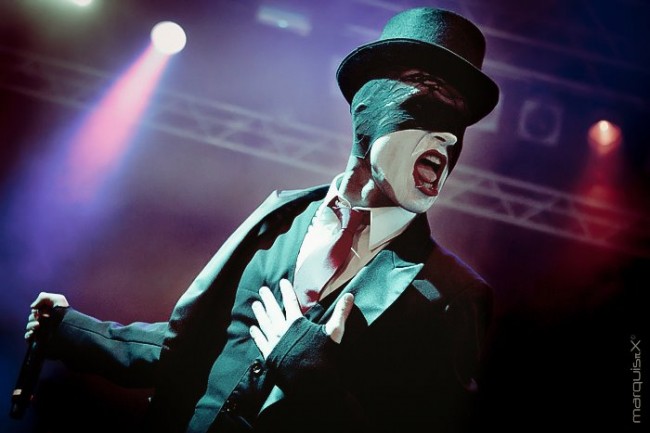
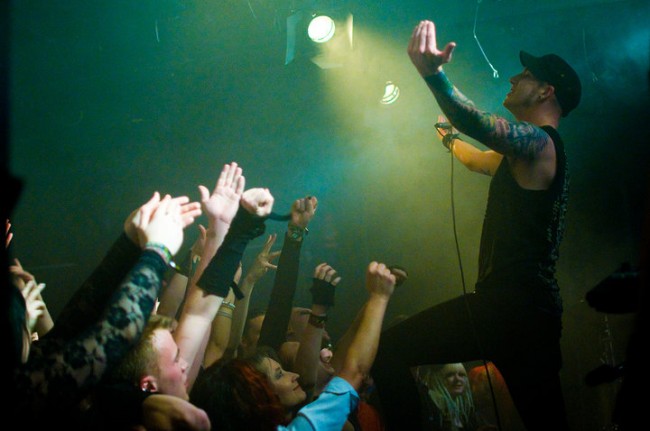
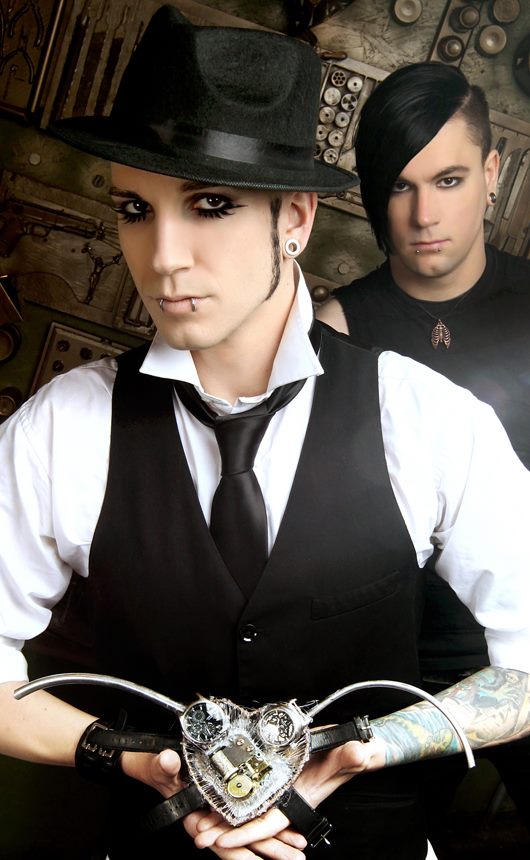

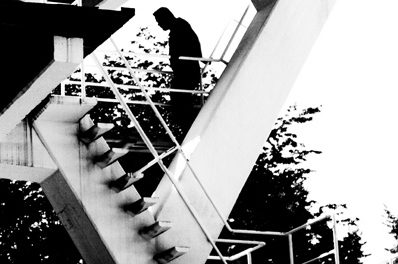
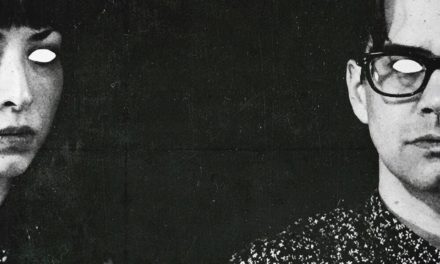
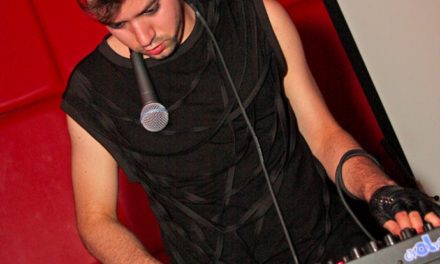
I really like that Daniel talks about listening to pop music. I remember listening to an interview with Lady Gaga on German television where she said the sound for “Fame/Monster” was inspired partly by listening to lots of gothic-industrial music while touring Europe. It’s nice to see it bounced back.
There’s an unfortunate tendency among some people who are into this “scene” to want to reject everything “mainstream.” It’s a very cult-ish behavior. Problem is that leads to insularity and creative death, not inspiration. As Daniel says, you get inspiration from everywhere whether you want to or not. In general, I think industrial can learn a lot from pop music and popular culture. And pop music can learn from industrial.
Another thing about pop music: It’s called pop music because it’s popular. And it’s popular because it works. It’s enjoyable to listen to. It’s great musicians like Daniel recognize this and apply it to their own tunes.
Nice interview guys. I’ve seen AP a few times in Toronto and they’ve always delivered (even in the shittiest dives!). He seems like a hard working, down-to-earth dude (yes, cliche). Thanks for this